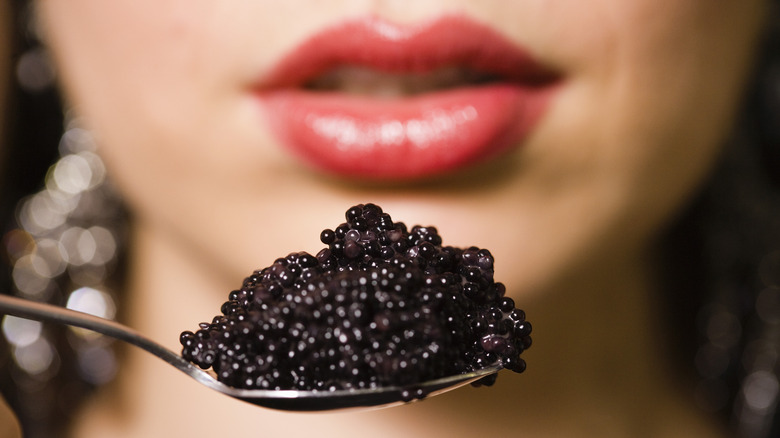Are You Supposed To Chew Caviar?
CORRECTION 3/6/23: A previous version of this article stated caviar brand Petrossian is 98 years old. At the time of publication, the brand is 103.
Caviar is expensive and a luxury food that is meant to be enjoyed. While most of us aren't buying the $25,000 variety of this delicacy, even a modest brand of decent caviar will run you at least $45 an ounce. For that reason alone, when you eat this roe, you want to maximize your culinary pleasure. Whether you are eating it on a canapé or atop your favorite Wolfgang Puck salmon and caviar pizza, you want to savor every last morsel. However, when it comes to this prized food, there are a lot of dos and don'ts.
In fact, regardless if you've been eating caviar for years or you're new to the virgin sturgeon fish egg scene, its etiquette can be a little confusing. There are plenty of people who say caviar is best served chilled, while others argue it needs to be eaten at room temperature to get the maximum flavor. Some people like to pair it with champagne, while others opt for ice-cold vodka. Additionally, you should never serve caviar in a metal bowl and should always use silver or mother-of-pearl spoons when eating it. You might even be wondering if you should chew your caviar or hold it on your tongue like a fine wine.
To chew or not to chew
The food experience is really a compilation of all five of our senses, whether we consciously think about it or not. Seeing and smelling are done instinctively and without much thought. When a delicious aroma catches your nose, and the appearance of a dish makes you want to sink your teeth into it, these two senses are in full effect. But taste is ultimately the sense that keeps us shoveling something in our mouth. Chewing is one of, if not the most important, ways we experience food. While it is considered the first step of the digestive process, it is also how your teeth and tongue meet all the flavors and textures of a dish.
However, when it comes to caviar, it might surprise you to learn that chewing is placed in the row of "don'ts." Christopher Klapp of Parisian caviar brand Petrossian told Food & Wine you actually should not chew your caviar but instead let it melt in your mouth, only moving it around with your tongue to get its full effect. While caviar is often described as both "salty" and mildly "fishy" when it comes to taste, it also has a buttery burst of flavor that is even richer when you don't chew the fish eggs and instead allow them to disintegrate in your mouth.

